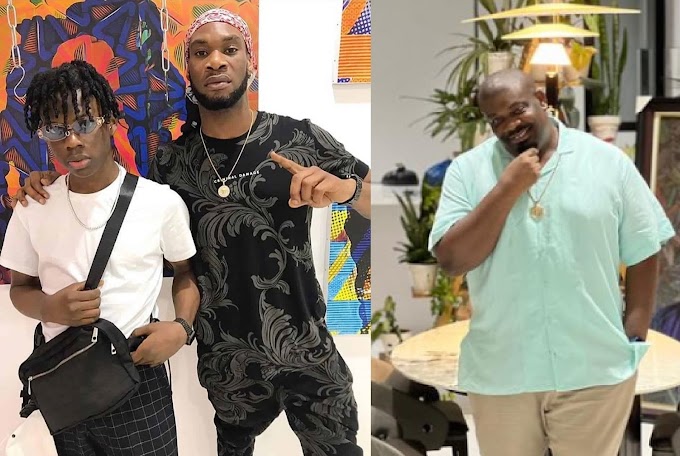 |
| Priscilla Ajoke & Juma Jux |
Weddings are a grand affair in Africa, filled with colorful traditions, vibrant music, and rich cultural heritage. Every country in Africa has its unique customs and styles, making weddings on the continent a spectacle to behold. In this article, we'll explore the top 10 African countries known for hosting the most beautiful and culturally significant weddings. From opulent ceremonies to intricate traditional rites, these nations showcase the diversity of African nuptials in a breathtaking way.
1. Nigeria – A Fusion of Elegance and Tradition
Nigeria is known for its lavish wedding ceremonies that combine modernity and deep-rooted traditions. Nigerian weddings are a multi-day affair, often involving both traditional and Western-style ceremonies. The traditional ceremony, known as the "engagement," is where the groom's family formally asks for the bride's hand in marriage. This part of the wedding is vibrant, with guests wearing colorful traditional attire such as the Yoruba’s 'Aso Oke' or the Igbo’s 'George wrapper.'
A Nigerian wedding isn't complete without a large crowd of family and friends, delicious food, and lively music. Food plays a central role, with dishes like jollof rice, pounded yam, and pepper soup being staples. In the Western-style ceremony, brides often opt for white gowns and grooms for suits, blending global wedding fashion with African flair. The after-party, known as the reception, is filled with dancing to the latest Afrobeats music, signifying the joyous celebration of the union.
2. South Africa – A Showcase of Diversity
South African weddings are an epitome of the country’s cultural diversity. With 11 official languages and numerous ethnic groups, each wedding reflects a unique blend of customs. In traditional Zulu weddings, for instance, the bride wears a vibrant outfit known as 'isidwaba,' accompanied by beadwork symbolizing her marital status. The groom presents gifts to the bride's family, showcasing a custom known as 'lobola,' or bride price, which is an important part of many South African cultures.
Modern South African weddings often incorporate both traditional and contemporary elements. Couples might choose a Christian wedding in a church followed by a traditional ceremony, or they might have their union formalized in an outdoor setting, capitalizing on South Africa’s stunning landscapes. The festivities are not just about the couple but a celebration involving the entire community, filled with singing, dancing, and a sumptuous feast.
3. Kenya – Where Traditions Meet Modern Love
Kenyan weddings are a colorful spectacle, showcasing the rich cultural heritage of its over 40 ethnic groups. One of the most notable traditional wedding customs is the Kikuyu's 'ruracio,' or dowry negotiation, where the groom's family offers gifts to the bride's family as a sign of respect and to formalize the marriage.
Modern Kenyan weddings often include a blend of church ceremonies, traditional rituals, and an elaborate reception. The reception is where the party truly comes alive, with music, dance, and various forms of entertainment. Couples often go for a photoshoot at breathtaking locations such as the Nairobi National Park or the beautiful beaches of Mombasa, creating unforgettable memories of their special day.
4. Ghana – Celebrating Heritage Through Nuptials
Ghanaian weddings are known for their vibrant colors, music, and elaborate ceremonies. One of the most prominent traditional customs in Ghana is the 'knocking' ceremony, where the groom's family formally announces their intention to marry the bride. This is followed by a series of negotiations between the families before the main wedding event takes place.
Ghanaian couples often choose to have both a traditional and a church wedding. During the traditional ceremony, the bride is adorned in colorful kente cloth, symbolizing Ghana’s rich cultural heritage. The church wedding, on the other hand, follows a more Western-style format, with brides typically wearing a white gown. Ghanaians love to dance, so the reception is usually a lively affair with highlife and Afrobeat music filling the air.
 |
| Becca & Tobi Sanni Daniel |
5. Ethiopia – A Unique Blend of Spirituality and Culture
Ethiopian weddings are steeped in religious and cultural significance, often reflecting the country’s deep Orthodox Christian heritage. The 'Kenyel,' or the traditional Ethiopian wedding, involves several rituals that have been passed down for generations. The bride and groom don traditional attire made from a fabric known as 'habesha kemis,' often embroidered with intricate designs.
Ethiopian weddings can span several days, beginning with the 'telosh,' a ceremony where the groom's family presents gifts to the bride. The main wedding day is often a large celebration involving a church ceremony, which is deeply spiritual and solemn. The reception is a time for celebration, with traditional music, dance, and a feast featuring dishes like 'injera' and 'doro wat.'
6. Morocco – A Festival of Colors and Rituals
Moroccan weddings are famous for their grandeur and extensive rituals, which can last up to seven days. The ceremony is a luxurious affair, characterized by an array of colorful decorations, traditional attire, and sumptuous feasts. One of the highlights of a Moroccan wedding is the 'henna ceremony,' where the bride's hands and feet are adorned with intricate henna designs, symbolizing beauty and protection.
The wedding itself is usually held in a lavish venue, such as a palace or a beautifully decorated hall. The bride wears a series of elaborate outfits throughout the celebration, often featuring stunning embroidery and vibrant colors. Guests indulge in a feast of traditional Moroccan dishes like couscous, tagine, and pastilla. Music, drumming, and belly dancing are integral parts of the celebration, making Moroccan weddings a spectacular cultural event.
7. Egypt – Ancient Traditions Meet Modern Glamour
Egyptian weddings are a blend of ancient traditions and modern celebrations. The wedding process typically begins with the 'khotuba,' or engagement, where the groom's family asks for the bride's hand in marriage. After that, a series of traditional ceremonies take place, including the 'henna night,' where the bride and female relatives gather for a night of music, dancing, and applying henna.
On the wedding day, a grand ceremony takes place, often in a lavish hotel or a beautifully decorated venue. Egyptian brides usually wear white wedding gowns, and the reception is a high-energy event filled with music, dancing, and a lavish dinner. The wedding party often includes a 'zaffa,' a musical procession featuring drums, belly dancers, and traditional musicians, creating an atmosphere of festivity and joy.
8. Uganda – Rich in Cultural Symbolism
In Uganda, weddings are culturally significant events that involve both the couple's families and the larger community. Traditional Ugandan weddings, such as the 'Kwanjula' (introduction ceremony) among the Baganda people, are grand affairs where the groom's family presents gifts to the bride's family. These ceremonies are characterized by vibrant traditional attire, particularly the bride’s 'gomesi,' a beautiful and colorful dress.
In addition to the traditional ceremonies, many Ugandan couples opt for a church wedding, which is followed by a lively reception. The reception is an elaborate celebration involving music, dance, and a banquet of traditional Ugandan dishes. Guests often give gifts to the newlyweds, and the atmosphere is one of joy, love, and community support.
9. Ivory Coast – Festivities Rooted in Culture
Ivorian weddings are known for their joyful and spirited celebrations. The traditional wedding, often referred to as the 'dot,' is where the groom's family presents the dowry to the bride's family, which is a deeply respected custom in Ivorian culture. This ceremony is accompanied by music, dance, and the exchange of gifts between the families.
After the traditional ceremony, a church or civil wedding may follow, blending Western influences with Ivorian cultural elements. The reception is the heart of the celebration, filled with vibrant music, dancing, and feasting. Guests indulge in Ivorian dishes like 'attiéké' and 'aloco,' while traditional music sets the tone for a night of celebration.
10. Tunisia – A Fusion of Ancient Rituals and Modern Elegance
Tunisian weddings are a captivating blend of ancient rituals and modern-day elegance. The pre-wedding festivities, known as the 'henna night,' are a central part of Tunisian wedding culture. During this event, the bride's hands and feet are adorned with henna, signifying good luck and protection for her future.
The main wedding celebration is usually held in a beautifully decorated venue, often lasting several days. Tunisian brides wear multiple outfits throughout the wedding, starting with traditional attire and moving to modern, Western-style wedding gowns. Guests are treated to a feast of Tunisian cuisine, including dishes like couscous and pastries like 'baklava.' Music and dance are integral, with the 'zaffah' procession marking the entrance of the bride and groom, accompanied by traditional Tunisian rhythms.
Conclusion
African weddings are a remarkable blend of tradition, culture, and modernity. Each country offers its unique style of celebration, making weddings in Africa a truly diverse and vibrant affair. From the grandeur of Nigerian weddings to the ancient customs of Ethiopian ceremonies, these nuptials showcase the continent's rich heritage and love for festivities. If you're looking to experience an unforgettable wedding, any of these countries would offer a glimpse into the beauty and spirit of African marital traditions.



















1 Comments
You no like post my wedding pics
ReplyDeleteHotter than Davido’s 🤩